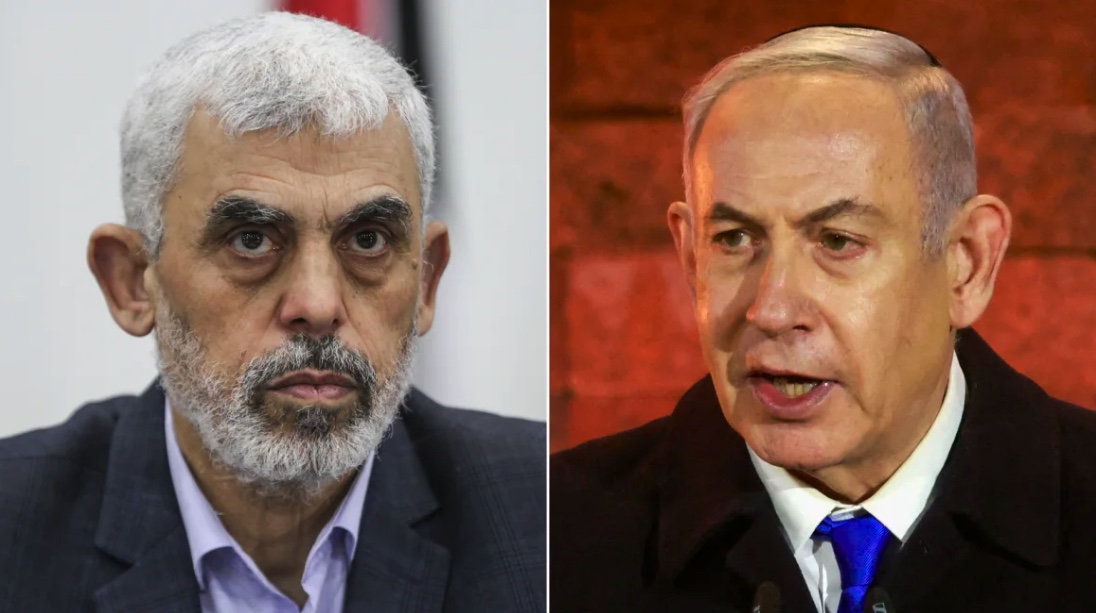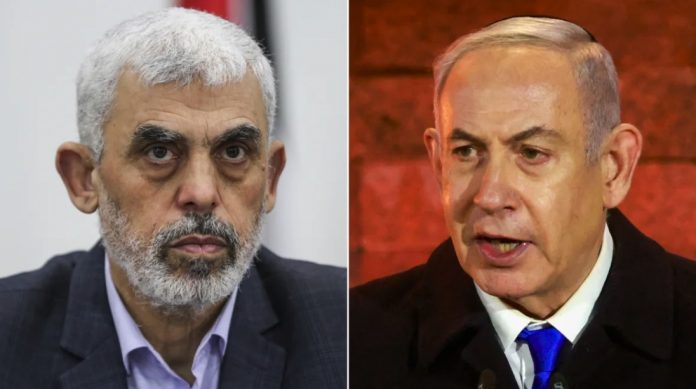อัยการของศาลอาญาระหว่างประเทศ (ICC) กำลังขอหมายจับผู้นำกลุ่มฮามาสและผู้นำอิสราเอล ในข้อหาก่ออาชญากรรมสงครามและอาชญากรรมต่อมนุษยชาติที่เกี่ยวข้องกับการโจมตีเมื่อวันที่ 7 ตุลาคม และความขัดแย้งในฉนวนกาซาที่ตามมา หากได้รับการอนุมัติ หมายจับจะมุ่งเป้าไปที่นายกรัฐมนตรีเบนจามิน เนทันยาฮู ของอิสราเอล, รัฐมนตรีกลาโหม ยูอาฟ กัลลันท์ และเจ้าหน้าที่อาวุโสของกลุ่มฮามาส ยาห์ยา ซินวาร์, อิสมาอิล ฮานิยาห์ และโมฮัมเหม็ด เดอิฟ การขอหมายจับเป็นขั้นตอนแรกและไม่ได้บ่งชี้ว่ามีความผิด หาก ICC พบหลักฐานเพียงพอ ก็จะสามารถเรียกตัวผู้ต้องสงสัยหรือออกหมายจับได้โดยอาศัยประเทศสมาชิกในการบังคับใช้ การพิจารณาคดีก่อนกำหนดว่าคดีควรเข้าสู่การพิจารณาคดีหรือไม่ หากการดำเนินการดำเนินต่อไป ผู้พิพากษา ICC สามคนจะดูแลการพิจารณาคดี และการฟ้องร้องจะต้องพิสูจน์ความผิดของผู้ต้องสงสัย “โดยปราศจากข้อสงสัยอันสมเหตุสมผล” ตามคำตัดสิน บุคคลอาจได้รับโทษจำคุกสูงสุด 30 ปี และอาจขยายไปตลอดชีวิตได้ภายใต้สถานการณ์พิเศษ ตามที่ศาลระบุ ICC ได้ออกหมายจับบุคคล 42 คน โดย 21 คนถูกควบคุมตัวผ่านความร่วมมือของรัฐสมาชิก
ศาลสามารถสอบสวนการก่ออาชญากรรมที่ถูกกล่าวหาในดินแดนหรือโดยคนชาติของรัฐใดๆ ที่ยอมรับเขตอำนาจศาลได้โดยการลงนามในธรรมนูญกรุงโรม ซึ่งเป็นสนธิสัญญาที่ก่อตั้ง ICC รัฐสมาชิกใดๆ สามารถขอให้อัยการของ ICC ดำเนินการสอบสวนได้ โดยก่อนหน้านี้ศาลได้ออกหมายจับบุคคลระดับสูงแล้ว ได้แก่ อดีตประธานาธิบดีซูดาน โอมาร์ อัล-บาชีร์, ซาอิฟ กัดดาฟี บุตรชายของโมอัมมาร์ กัดดาฟี ผู้นำลิเบียผู้ล่วงลับ และล่าสุด , ประธานาธิบดีวลาดิมีร์ ปูติน แห่งรัสเซีย รัฐที่ลงนามมีหน้าที่ต้องจับกุมผู้ที่ต้องเผชิญกับหมายจับ แต่ผู้นำมักพยายามหลบเลี่ยงหมายจับเหล่านั้น โดยจำกัดเสรีภาพในการเดินทางของพวกเขา ICC ไม่มีกลไกการบังคับใช้ของตนเองและอาศัยการสนับสนุนจากประเทศต่างๆ ในการจับกุม
ห้าประเทศ ได้แก่ แอฟริกาใต้ บังกลาเทศ โบลิเวีย คอโมโรส และจิบูตี ได้ส่งการกระทำของอิสราเอลในฉนวนกาซาไปยัง ICC ในเดือนพฤศจิกายน เพื่อเรียกร้องให้มีการสอบสวนอาชญากรรมที่อาจเกิดขึ้น แม้ว่าอิสราเอลจะไม่ยอมรับเขตอำนาจศาลของ ICC เนื่องจากไม่ได้ลงนามในธรรมนูญกรุงโรม แต่พลเมืองของประเทศดังกล่าวยังคงอาจถูกดำเนินคดีได้ ICC ได้สืบสวนอาชญากรรมที่อาจเกิดขึ้นจากอิสราเอลมาตั้งแต่ปี 2557 ในฉนวนกาซา เวสต์แบงก์ที่ถูกยึดครอง และเยรูซาเลมตะวันออก
นักการเมืองทั้งกลุ่มฮามาสและอิสราเอลต่างวิพากษ์วิจารณ์การกระทำของ ICC กลุ่มฮามาสประณามการกระทำดังกล่าวว่าเป็นความพยายามที่จะ “เปรียบเหยื่อเท่ากับผู้รุกราน” และวิพากษ์วิจารณ์ช่วงเวลาของการขอหมายจับเนทันยาฮูและความกล้าหาญ นักการเมืองอิสราเอลจากพรรคต่างๆ ประณามการตัดสินใจดังกล่าว โดยรัฐมนตรีต่างประเทศ อิสราเอล แคทซ์ เรียกการตัดสินใจดังกล่าวว่าเป็น “การตัดสินใจที่น่าอับอาย” และผู้นำฝ่ายค้าน ยาอีร์ ลาปิด ประณามการตัดสินใจดังกล่าว “เป็นความล้มเหลวทางศีลธรรมโดยสิ้นเชิง” นอกจากนี้ รัฐมนตรีกระทรวงความมั่นคงแห่งชาติ อิตามาร์ เบน กวีร์ กล่าวหา ICC ว่าต่อต้านยิว ในขณะที่รัฐมนตรีกระทรวงการคลัง เบซาเลล สโมตริช เปรียบเรื่องนี้เป็น “โฆษณาชวนเชื่อของนาซี” ขณะเดียวกัน ในสหรัฐอเมริกา ประธานาธิบดีโจ ไบเดน ประณามการกระทำของอัยการไอซีซีว่า “อุกอาจ”
Hamas and Israeli leaders could face international arrest warrants.

The International Criminal Court’s (ICC) prosecutor is seeking arrest warrants for top Hamas and Israeli leaders on war crimes and crimes against humanity charges related to the October 7 attacks and the ensuing Gaza conflict. If approved, arrest warrants would target Israeli Prime Minister Benjamin Netanyahu, Defence Minister Yoav Gallant, and senior Hamas officials Yahya Sinwar, Ismail Haniyah, and Mohammed Deif. Seeking arrest warrants is the first step and does not indicate guilt. If the ICC finds enough evidence, it can summon the suspect or issue an arrest warrant, relying on member countries for enforcement. A pre-trial determines if the case should go to trial. If it proceeds, three ICC judges will oversee the trial, and the prosecution must prove the suspect’s guilt “beyond reasonable doubt.” Following a verdict, individuals may receive up to a 30-year prison sentence, extendable to life under exceptional circumstances, as per the court. The ICC has issued arrest warrants for 42 people, with 21 detained through member state cooperation.
The court can investigate alleged crimes committed on the territory, or by a national, of any state that has accepted the court’s jurisdiction by signing the Rome Statute, the treaty that established the ICC. Any member state can ask the ICC’s prosecutor to launch an investigation The court has previously issued arrest warrants against high-ranking individuals, including former Sudanese president Omar al-Bashir, Saif Gadhafi, the son of the late Libyan leader Moammar Gadhafi, and most recently, Russian President Vladimir Putin. Signatory states are obliged to apprehend those facing arrest warrants, but leaders have often sought to evade those warrants, restricting their freedom of movement. The ICC does not have its own enforcement mechanism and has relied on countries’ support for arrests.
Five countries—South Africa, Bangladesh, Bolivia, Comoros, and Djibouti—referred Israel’s actions in Gaza to the ICC in November, urging an investigation into potential crimes. Despite Israel not recognising the ICC’s jurisdiction due to not signing the Rome Statute, its citizens could still face prosecution. The ICC had already been investigating possible crimes by Israel since 2014 in Gaza, the occupied West Bank, and East Jerusalem.
Both Hamas and Israeli politicians have criticised the ICC’s action. Hamas denounced it as an attempt to “equate victims with aggressors” and criticised the timing of the warrant requests for Netanyahu and Gallant. Israeli politicians from various parties condemned the decision, with Foreign Minister Israel Katz calling it a “scandalous decision” and opposition leader Yair Lapid labelling it “a complete moral failure.” Additionally, National Security Minister Itamar Ben Gvir accused the ICC of antisemitism, while Finance Minister Bezalel Smotrich likened it to “Nazi propaganda.” Meanwhile, in the United States, President Joe Biden has condemned the ICC prosecutor’s action as “outrageous.”
By CNN NEWS

















